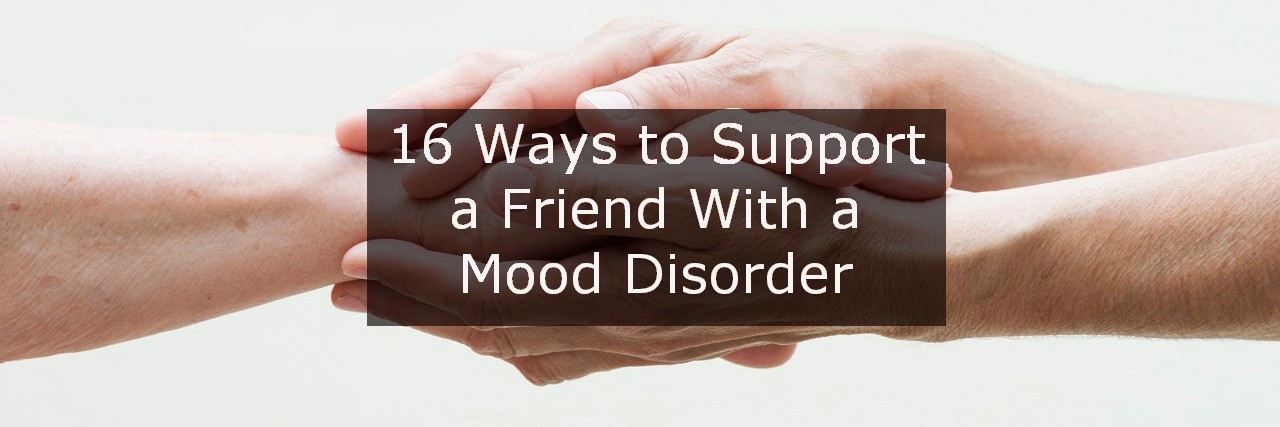For the over 20 million adults living with a mood disorder, finding someone who understands how to help can be a real challenge — especially if friends and family don’t know what to do or say.
That’s why we teamed up with the Depression and Bipolar Support Alliance and their “I’m Here” campaign to ask people who live with mood disorders how their support systems can help.
Here’s what they had to say:
1. “Please let me talk about it without changing the subject. When people avoid it or act like the mere mention of depression or anxiety makes them uncomfortable, I stop talking about it. I begin to feel ashamed of my illness and symptoms, which only makes my disorder worse. It is hard for me to feel like the only person I can share my struggle with is the therapist I pay to listen.” — Jennifer G.
2. “Know I can be sad or angry or happy outside of my illness. I am human and I have human emotions that exist alongside and outside of my mental illness.” — Deedee W.
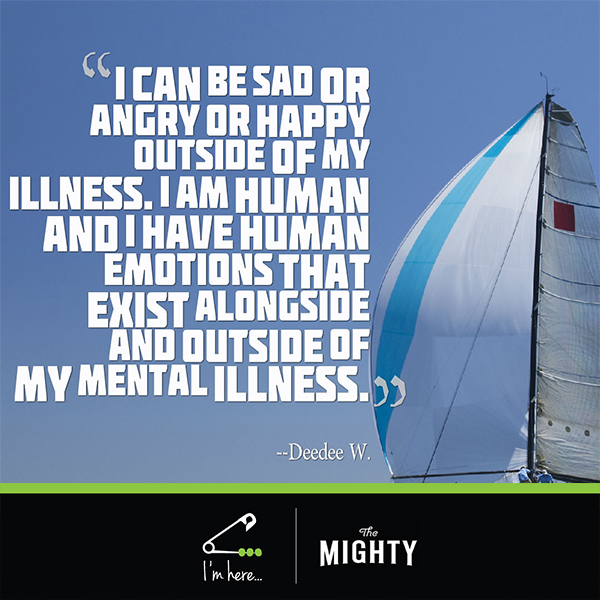
3. “If you say you don’t want to go somewhere or hang out if someone asks you to, just say OK. Don’t be judgmental and think excuses are being made not to do things with you. Sometimes, I just don’t want to. It isn’t about you. It’s about the disorder. I won’t even go to the grocery store for goodness sake. So please try to be understanding that sometimes we are better not being around people.” — Lish K.
4. “Reach out, sometimes I fear if I reach out I’m being a bother, or I will have to spend five minutes reminding you who I am because I’m not a memorable person. Be understanding if I ramble for a while; I do this when I’m anxious.” — Cheri E.
5. “Sometimes I just need someone to care enough to truly listen. Often I know what I should or could do and don’t need to be told. Just a supportive ear and sometimes a shoulder to cry on with no agenda other than to just be there.” — Stephanie C.
6. “Stop making jokes about mental illness. Stop saying I could be happy or normal if I wanted to. Stop implying I’m being lazy and want to feel this way. Realize this is a disease just like cancer or diabetes is a disease. Changing diets and willpower alone are not going to cure me. There isn’t a cure; this is a chronic illness. Following my treatment plan and taking meds are taking care of myself.” — Nita D.
7. “Whatever decision I make about treatment is what’s right for me. You don’t need to make me feel bad about it because it’s not something you agree with. You wouldn’t criticize a diabetic for getting insulin for a malfunctioning pancreas, why criticize me for choosing antidepressants for a malfunctioning brain?” — Libby E.

8. “Make the time to meet and listen to me. People don’t realize how much it affects me when they’re ‘too busy’ to make the time for me. If I send a text saying I’m not doing so well and need to see a friendly face, I need that person to just ask where and when. Best thing anyone can do when I’m feeling vulnerable is just give me a hug. I’ll probably cry, but I just need someone to be there and show they’re not uncomfortable with me getting upset.” — Claire P.
9. “Let me talk about my mental health without it becoming a competition about whose day is worse or who is struggling the most.” — Elisa C.
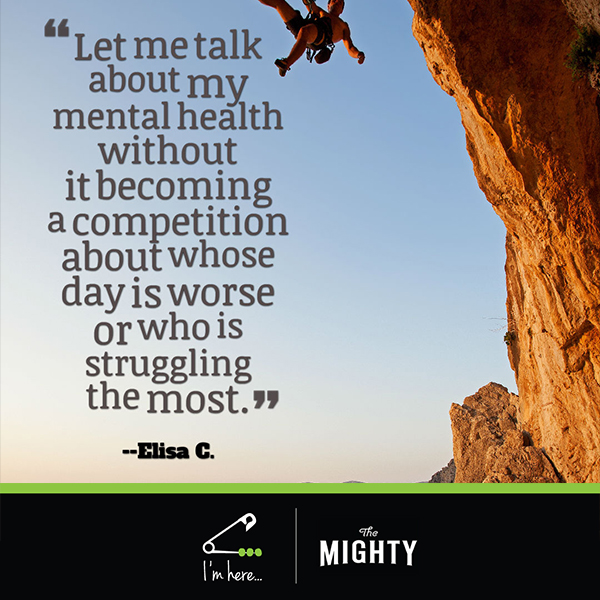
10. “There will be days where I’ll be up for taking on the world. And there will be days I can’t even get out of bed. Please don’t make me feel more ashamed because of your canceled plans.” — Teresa A.
11. “You don’t have to understand exactly how I feel, but just listen and validate my feelings while encouraging me use the tools I have to keep going.” — Alicia N.
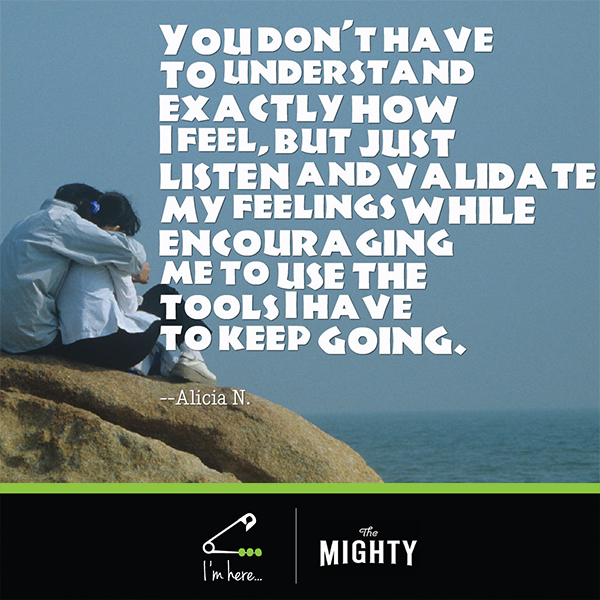
12. “Take time to learn about the disease. By learning about my bipolar disorder 2 you can help me help myself.” — Karla I.
13. “Don’t be arrogant and have the ‘I’m better than you’ attitude. I have a highly creative, problem-solving brain. I’m not stupid and I’m in great physical shape. Bipolar means I am inconsistent in the things I’m interested in. My likes and dislikes change a lot. I say bizarre things sometimes. To me I’m either craving deep conversation or I’m being humorous. I can be whimsical and then practically house bound. Not everyone can handle this and it’s OK, just don’t be an a-hole — that’s all I ask.” — Nicole W.
14. “I snap from one mood to the other faster than you can blink at times. Just try to be understanding and forgiving because this is just me. I was born this way and I’m trying to adjust and find a way to make it better.” — Brandy M.
15. “Don’t assume every time I get upset that I’m having ‘an episode.’ I’m genuinely allowed to go from happy to frustrated when you do something frustrating!” — Nancy L.
16. “Keep inviting us to things periodically, no pressure no judgment, even when we’re withdrawn. It lets us know you’ll still be there for us when we can be there with you.” — Sarah K.
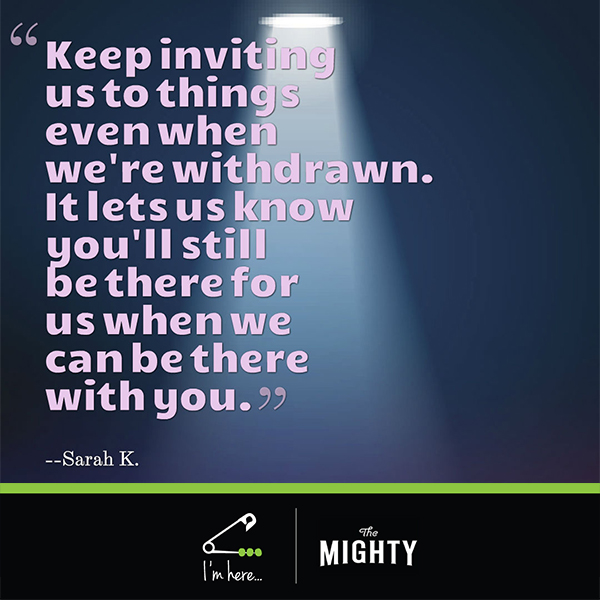
*Some answers have been edited for length.
To learn more about DBSA’s “I’m Here” campaign, click here.
I’m here… is a program brought to you by DBSA made possible through the support of Rebecca’s Dream® Foundation.

